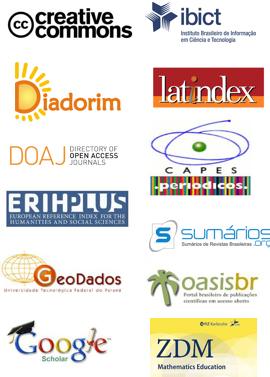A Categorização do Raciocínio Matemático de Alunos do Curso de Pedagogia como Contribuição a Formação de Professores
DOI:
https://doi.org/10.17921/2176-5634.2022v15n1p02-10Resumo
Resumo
A formação inicial de professores envolve não somente a compreensão dos conceitos a serem trabalhados, mas de práticas pedagógicas que melhor possibilitem à transposição didática desses conhecimentos pelo professor. Contudo, diante de um ensino, por vezes, mediado por regras sem qualquer significação para os alunos, objetivamos analisar as estratégias matemáticas apresentadas pelos alunos do curso de Pedagogia da Faculdade de Educação da Universidade Federal do Ceará (FACED/UFC) por meio da resolução de problemas matemáticos. De natureza qualitativa, do tipo interpretativa, coletamos os dados por meio de observações em aulas durante a disciplina de Ensino de Matemática do referido curso, como da elaboração de um conjunto de situações-problema, nas quais, ao serem respondidos pelos alunos, categorizamos as estratégias utilizadas com base na classificação feita por Magina et al. (2014) apresentadas por alunos da educação básica na resolução de problemas matemáticos e as analisamos à luz das ideias de Johannot (1947) sob uma nova sistematização. Os resultados indicaram que frente a dificuldade na resolução de um problema matemático, o aluno, com base na categorização criada por Johannot, busca pela solução do problema retornando a raciocínios mais elementares se comparados aos usados em outras atividades matemáticas. Assim, a compreensão sobre os tipos de manifestações destes raciocínios permitirá ao estudante de pedagogia melhorar seu campo de atuação tanto no planejamento como nas futuras mediações didáticas com seus alunos, bem como, possibilitar novas pesquisas no que envolve a formação de professores para o desenvolvimento do pensamento algébrico dos alunos.
Palavras-chave: Formação Inicial de Professores. Ensino da Matemática. Raciocínio Matemático.
Abstract
Initial teacher education involves not only the understanding of the concepts to be worked on, but also pedagogical practices that best enable the didactic transposition of this knowledge by the teacher. However, faced with a teaching that is sometimes mediated by rules without any meaning for the students, we aimed to analyze the mathematical strategies presented by students of the Pedagogy course of the Faculty of Education of the Federal University of Ceará (FACED/UFC) through the resolution of mathematical problems. Of qualitative nature, of interpretative type, we collected data through observations in classes during the subject of Mathematics Teaching of the mentioned course, as well as the elaboration of a set of problem situations, in which, when answered by the students, we categorized the strategies used based on the classification made by Magina et al. (2014) presented by basic education students in solving mathematical problems and analyzed them in the light of Johannot's ideas (1947) under a new systematization. The results indicated that when faced with difficulty in solving a mathematical problem, the student, based on the categorization created by Johannot, seeks to solve the problem by returning to more elementary reasoning compared to that used in other mathematical activities. Thus, the understanding of the types of manifestations of these reasonings will allow the student of pedagogy to improve his field of action both in planning and in future didactic mediations with his students, as well as to enable new research in what involves the training of teachers for the development of students' algebraic thinking.
Keywords: Initial Teacher Education. Mathematics Teaching. Mathematical Reasoning.


